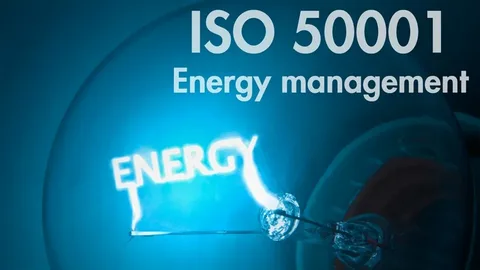Power Up Your Efficiency: How ISO 50001 Transforms Energy Management

Table of Contents
-
What Is ISO 50001 Energy Management?
-
Why Energy Management Is a Game-Changer Today
-
Benefits of ISO 50001 Certification
-
Who Needs ISO 50001?
-
Inside the ISO 50001 Framework
-
How ISO 50001 Boosts Risk and Compliance
-
Aligning ISO 50001 with Other ISO Standards
-
Your Roadmap to ISO 50001 Certification
-
Final Thoughts
-
FAQs
What Is ISO 50001 Energy Management?
Let’s keep it simple. ISO 50001 Energy Management is a globally recognized standard that helps businesses manage and improve how they use energy. It’s not just for big industries—it’s for any organization that wants to cut energy costs, boost sustainability, and stay ahead of regulations.
It gives you a framework to track, control, and improve your energy performance. You’ll save money, reduce emissions, and be more efficient overall. That’s a win-win-win.
Why Energy Management Is a Game-Changer Today
We live in an energy-hungry world. And energy isn’t cheap. Whether you're a factory, a farm, or a fintech startup, energy costs can eat into your bottom line.
But here’s the twist: you can take control. ISO 50001 helps you:
-
Lower your energy bills
-
Cut your carbon footprint
-
Boost operational efficiency
-
Meet sustainability goals
And let’s not forget the growing pressure from customers, investors, and governments to go green. ISO 50001 shows you’re serious about it.
Benefits of ISO 50001 Certification
1. Real Cost Savings
Energy use is money out the door. ISO 50001 helps you plug the leaks.
2. Improved Energy Efficiency
From lighting to HVAC to production machinery, you’ll optimize every watt.
3. Carbon Reduction
With clear energy baselines, you’ll track progress toward greener goals.
4. Enhanced Reputation
Being ISO 50001 certified shows you walk the talk on sustainability.
5. Compliance Confidence
You’ll align with national and international regulations—no nasty surprises.
Who Needs ISO 50001?
It’s for anyone who uses energy. That’s… everyone. But here’s where it really shines:
Bold Table Heading Example
| Sector | Why ISO 50001 Matters |
|---|---|
| Manufacturing | Reduces waste in energy-intensive processes |
| Food Industry | Supports cold chain and production energy savings |
| Healthcare | Optimizes HVAC, lighting, and backup power systems |
| Tech and Data Centers | Cuts server room consumption and cooling load |
| SMEs | Cost-effective way to reduce overhead |
| Government & Education | Demonstrates sustainability and fiscal responsibility |
Inside the ISO 50001 Framework
Think of it like a fitness plan—for your energy use. It’s structured, repeatable, and goal-oriented.
Energy Review
Analyze current energy use and identify hotspots.
Energy Baseline
Set your starting point and measure progress from there.
Objectives and Targets
Define what better energy performance looks like.
Action Plans
Document who does what, by when, and how.
Monitoring and Measurement
Track usage and make adjustments as needed.
Continuous Improvement
Keep the cycle going—forever getting leaner and greener.
How ISO 50001 Boosts Risk and Compliance
ISO 50001 doesn’t just make you energy-efficient—it also helps you reduce broader risks and align with global standards:
-
Data Security Compliance: Less downtime = better uptime for energy-dependent digital systems.
-
Disaster Recovery Planning: Supports continuity by ensuring energy reserves and redundancy.
-
Occupational Risk Management: Lower energy waste = safer workspaces.
-
Device Safety and Performance: Avoid overheating, overloads, and downtime due to poor energy setups.
It all ties together—because energy touches everything.
Aligning ISO 50001 with Other ISO Standards
ISO 50001 integrates smoothly with your other ISO certifications, helping you build an all-in-one management system:
| Standard | Focus | How It Pairs with ISO 50001 |
| ISO 9001 | Quality Management | Aligns energy goals with quality objectives |
| ISO 27001 | Information Security | Supports secure, energy-stable IT environments |
| ISO 14001 (EMS certification) | Environmental Management | Strengthens sustainability credentials |
| ISO 45001 | Health & Safety | Lowers energy hazards in workplaces |
| ISO 22000 | Food Safety | Ensures efficient energy use in food processing |
Your Roadmap to ISO 50001 Certification
Here’s how to get it done without the stress:
1. Gap Analysis
Where are you now? What’s missing? Start here.
2. Develop an Energy Management System (EnMS)
Define your policies, processes, goals, and tools.
3. Train Your Team
Energy management is a team sport.
4. Internal Audit
Catch issues before your external audit.
5. Certification Audit
Hire a recognized provider (like ISO certification services in the UK).
6. Certification
Once you pass, flaunt that ISO 50001 badge with pride.
Pro Tip: For tight budgets, ISO certification services for small businesses UK offer tailored, budget-friendly paths to compliance.
Final Thoughts
Here’s the thing—energy management isn’t just about turning off the lights. It’s about building a smarter, leaner, and more resilient business.
With ISO 50001 Energy Management, you don’t just save on bills—you futureproof your operations. And with energy prices rising and environmental expectations growing, there’s no better time to act.
So if you're ready to stop wasting and start winning, ISO 50001 is your blueprint.
FAQs
1. Is ISO 50001 only for manufacturing companies?
Nope! Any organization that uses energy—offices, data centers, schools, hospitals—can benefit from ISO 50001.
2. How much energy can I expect to save?
Savings vary, but many companies report 10–30% reductions within the first year of implementation.
3. How does ISO 50001 differ from ISO 14001?
ISO 14001 focuses on environmental impact broadly. ISO 50001 zeroes in on energy use and efficiency.
4. How long does ISO 50001 certification take?
On average, 4–6 months, depending on your organization’s size and complexity.
5. Does ISO 50001 support sustainability goals?
Absolutely. It helps lower emissions, reduce waste, and build a culture of continuous energy improvement.
Sponsored article: Monetize the Streaming Boom: How to Thrive as an IPTV Reseller with a Reliable IPTV Server

